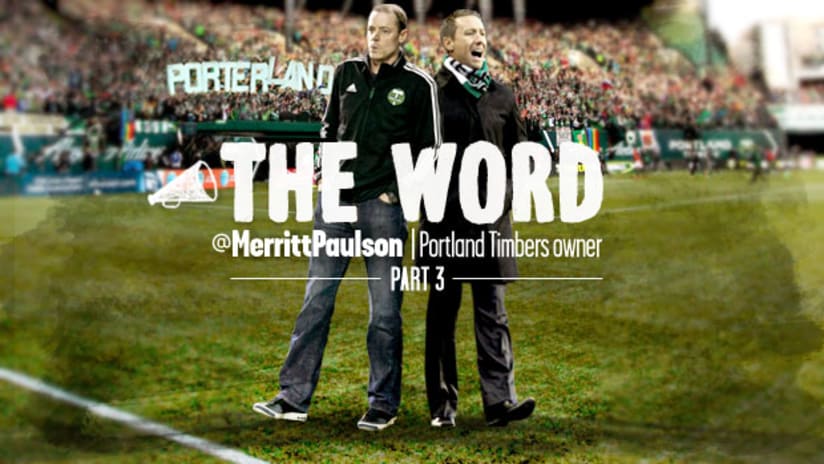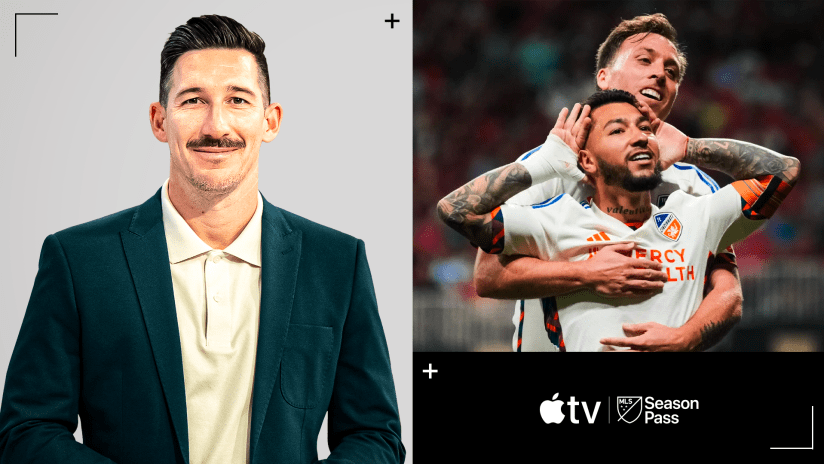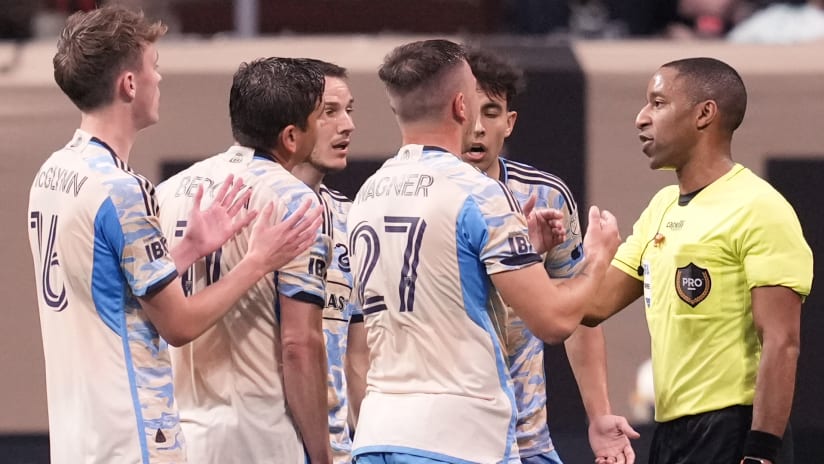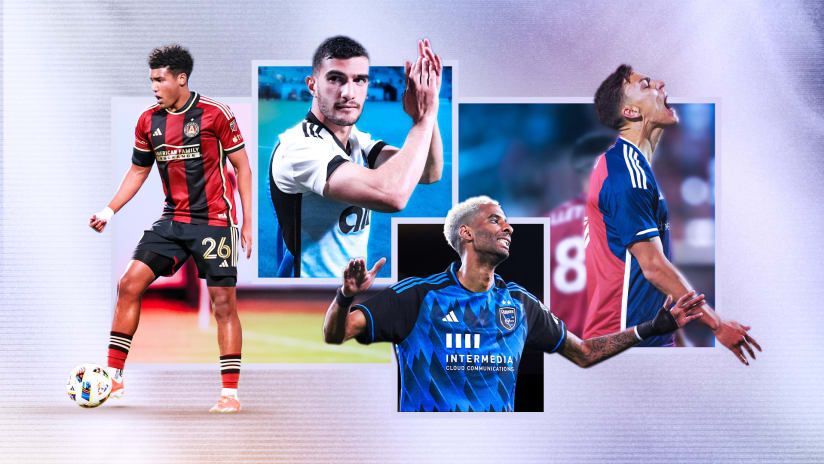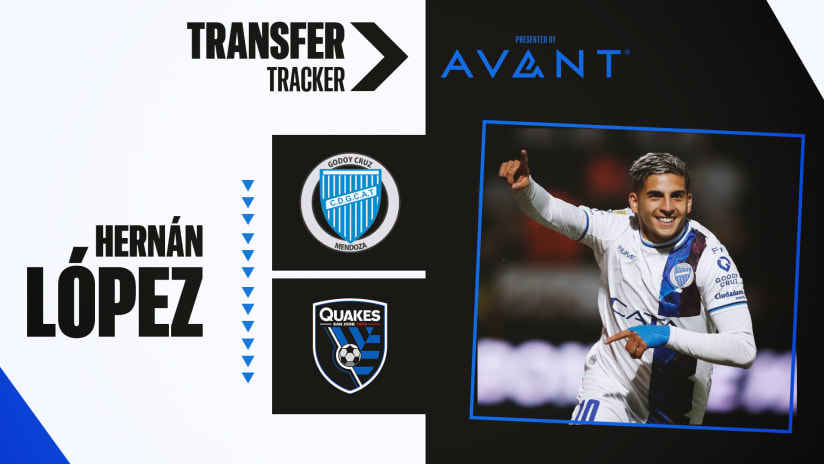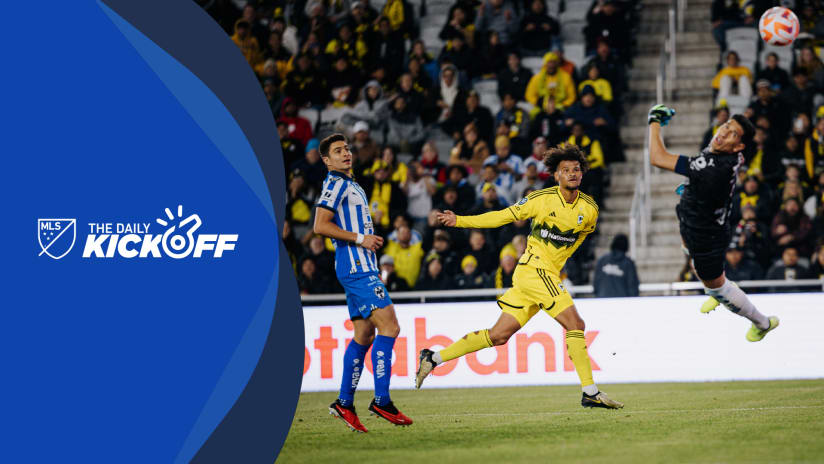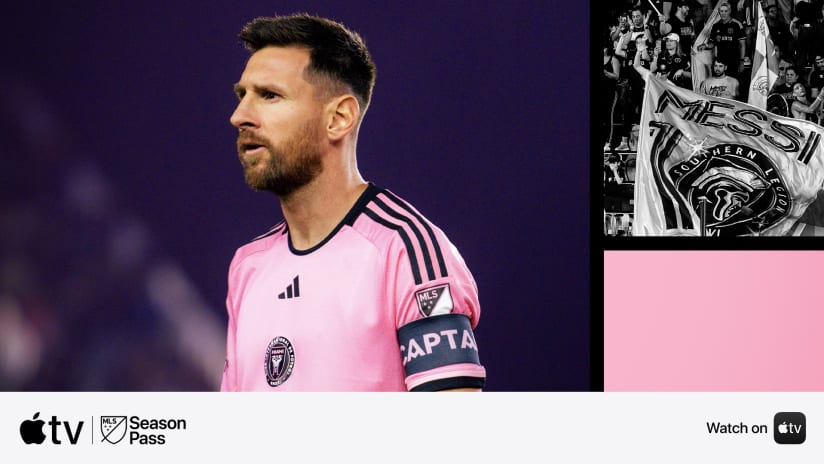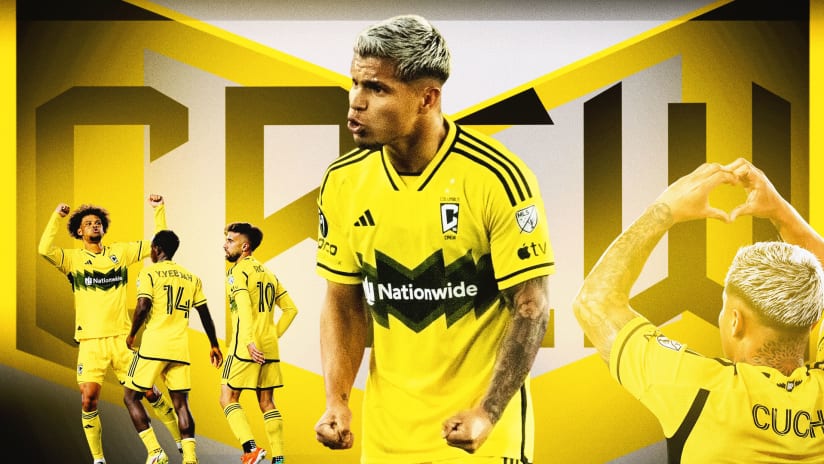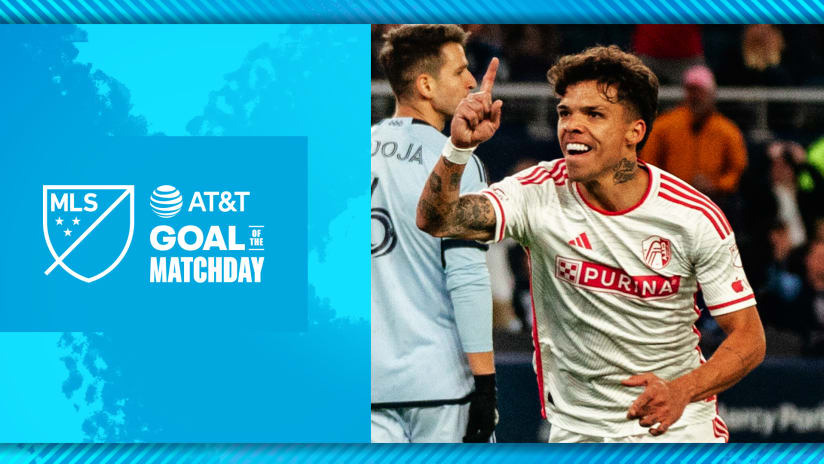"The Word" is MLSsoccer.com's weekly long-form series. In this week's final part of a three-part feature, senior editor Nick Firchau examines the relationship between Portland Timbers owner and president Merritt Paulson and general manager Gavin Wilkinson, and the expectations surrounding new head coach Caleb Porter.
Read the first part of the series here, and the second part of the series here.
PORTLAND, Ore. – When the Portland Timbers parted ways with embattled head coach John Spencer in July 2012, they didn’t look far for a replacement. He was the owner’s closest friend in Portland.
Sitting just inches to owner and president Merritt Paulson’s left during the emotional press conference that sealed Spencer’s fate was general manager Gavin Wilkinson, who had been by Paulson’s side since Day 1. Wilkinson – who first joined the Timbers as a player during the team’s days in the A-League in 2001 and became the team’s head coach in 2007 – is perhaps the person Paulson most trusts with his team’s on-field success, and has been the driving force behind the young owner’s soccer education since he bought the team six years ago.
But to expect Wilkinson to be the long-term solution to the Timbers’ problems? Even Paulson knew that might be asking too much. Paulson installed a reluctant Wilkinson into a double shift as both GM and interim head coach and set about finding Spencer’s permanent replacement for the 2013 season, a process that he said rejuvenated him after the disappointing and high-profile coaching change.
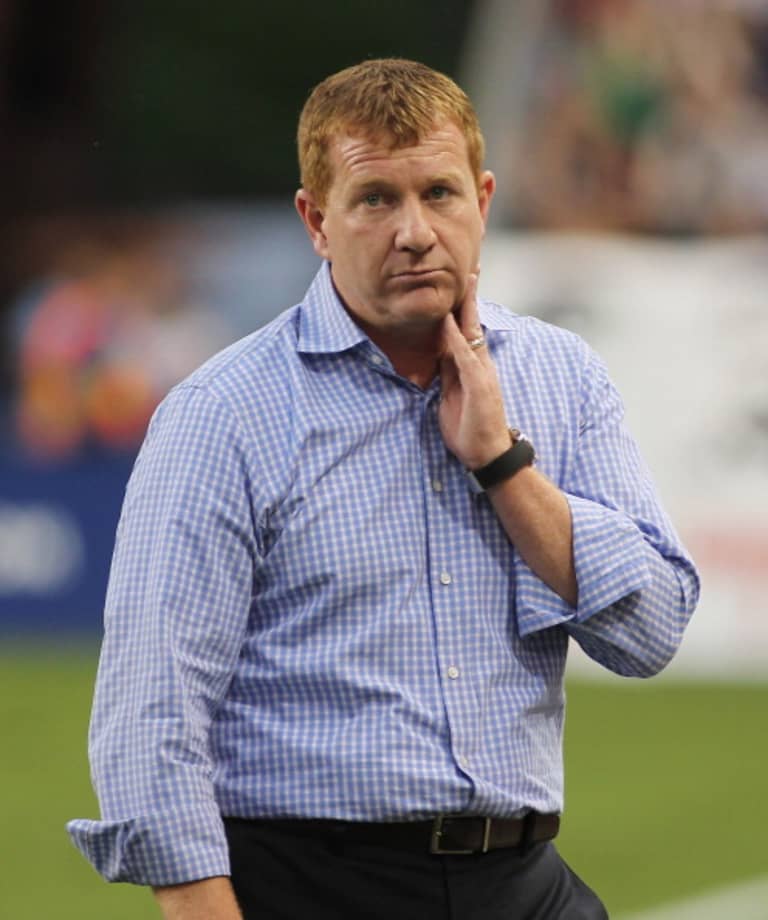
Portland Timbers general manager Gavin Wilkinson served as the team's head coach for four seasons before their MLS debut in 2011, but he says he was reluctant to take the post again when the 2012 season fell apart.
- Getty Images
Meanwhile Wilkinson still had to see out the season, and that proved far tougher than most expected for both GM and owner. He made his MLS coaching debut on July 14 in a nationally televised 5-3 defeat to the reigning MLS Cup champion LA Galaxy at JELD-WEN Field, and while the match was one of the team’s most thrilling of the year to watch – Designated Player Kris Boyd delivered two goals in his first game without friend and countryman Spencer as his coach – it laid bare the disparity between a real MLS title contender and the Timbers, who went on to lose their first four games with Wilkinson at the helm.
LIKE LONG FORM? DOWNLOAD THE OVERLAP MAGAZINE APP!
By the time the team’s winless streak under Wilkinson hit seven games in mid-August, some Timbers followers were already boiling over. Stirred in part by their resentment of Wilkinson dating back to the team’s last-place finish in the USL First Division in 2008 and the assumption it was Wilkinson, not Spencer, who had sunk the team again in MLS, the now-infamous “#GWOUT” outcry caught on in one of the last places Timbers fans wanted to battle Paulson: on Twitter.
Paulson didn’t hesitate. He fired back at Wikinson’s critics by calling them “idiotic” and “moronic,” making instant headlines in the Portland media, enraging some fans and offering a rare burst of public vitriol from a team owner hardly ever seen in professional sports. But for Paulson – who also playfully called another Timbers critic a “crackhead” via Twitter in May – it was a defense mechanism. Despite all the lumps he’d taken from local taxpayers during the process of renovating the downtown stadium and then from fans who loathed his decision to fire Spencer, he couldn’t take critics firing shots at his friend Wilkinson.
“I just couldn’t handle that,” Paulson told MLSsoccer.com in February. “I have an easier time when stuff is directed at me personally than if it’s directed at someone I think is being unfairly targeted. So I got defensive.”
Critics rallied around at least two points of contention during Wilkinson’s watch as GM. First, he'd missed on a few key personnel moves, most notably with the team’s ever-changing group of forwards. He’d been bullied by Spencer into allowing the Boyd deal to go through, forward Kenny Cooper was thriving in New York after a sleepy season in Portland, Colombian import Jorge Perlaza had proven ineffective and team doctors discovered José Adolfo Valencia had turned out to be damaged goods, requiring serious knee surgery just two months after he was signed.
And second, a number of supporters insisted that Wilkinson had always wanted to return to his coaching job with the Timbers, using Spencer’s firing to get his former job back. While both Wilkinson and Paulson can acknowledge some of the mistakes they made with players, both strongly disputes that Spencer was run out so Wilkinson could take his place.
The Timbers won their first game under Wilkinson on Aug. 25, a 2-1 victory against the playoff-bound Vancouver Whitecaps. Within the week, the Timbers announced that 37-year-old University of Akron head coach Caleb Porter would become the organization's second full-time MLS head coach following an exhaustive coaching search and would take over at the conclusion of the NCAA season. Meanwhile, Wilkinson would slip back into his GM role ahead of Year 3 in Portland.
Wilkinson, for his part, was a truly reluctant coach throughout most his roughly four months in charge and never lost sight of the critics who wanted to see him fired.
“When I took over the head coaching job it was to the detriment of my life, my family, absolutely everything,” he told MLSsoccer.com. “I made a significant amount of sacrifice. It was not something that I ever saw myself stepping into.”
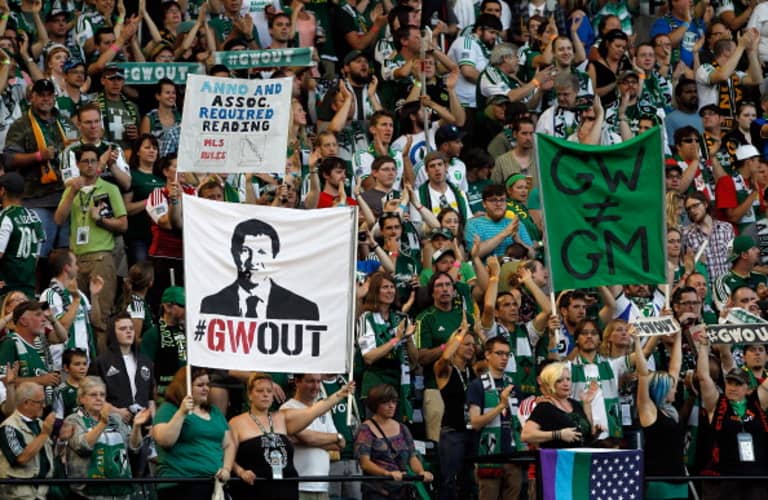
Timbers fans rallied around the "#GWOUT" cry as the Timbers' winless streak dragged deep into the summer last year, prompting owner and president Merritt Paulson to lash out against the critics.
- Getty Images
Paulson said in February that despite all the criticism placed on Wilkinson as the Timbers slipped into a free-fall last summer, he never considered firing his friend. That sentiment was echoed by a number of sources who told MLSsoccer.com they still feel like Wilkinson’s job security is a non-issue.
Said one source: “Even if Merritt fires Gavin as a GM, he’ll find a place for him somewhere in the organization. He’s made himself invaluable to Merritt. He’s his soccer brain.”
Wilkinson, however, seems to have a different take. He said he discussed his own job security only briefly with Paulson during the 2012 season, but it’s clear he at least caught a glimpse of what it might be like if his friend actually decided to make a change and give some fans what they wanted so badly.
“He’ll always look at results, and I’ve been around this game long to know results mean a lot,” Wilkinson said. “I don’t take for granted any day I’m here. Or that I’ll be back the next day.”
---
The average age of the past five head coaches to win MLS Cup is 50.8 years old. The average age of the past five head coaches to win the Supporters’ Shield is even older, at 54. And every name on that list other than 2010 Colorado Rapids head coach Gary Smith has either played or been a head coach in the league for more than a decade.
Three of the coaches who've won titles in the past seven years – Bruce Arena, Sigi Schmid and Dominic Kinnear – are Mount Rushmore types in MLS, each with at least two MLS Cups to their name and solid odds on adding another in 2013.
Caleb Porter listens to those statistics, leans back in his chair, and stares a hole across the desk at the reporter telling him about the old boys' network in MLS.
WATCH: Paulson discusses the team's hiring of Caleb Porter in August 2012.
“Yeah so … what’s the theme?” he asks. “Bruce, Sigi, Dom, they all had to learn. We need time to learn here, too.”
At 37 years old and just five months removed from a stellar seven-year career at Akron, Porter is the highest-profile coach to make the jump from college soccer to MLS since Schmid did it more than a decade ago. He’d been courted by teams before – most famously by D.C. United, a job offer he turned down – but, like Spencer two years before him, the lure of potential success in Portland was too much to resist. He walked away from a contract that would have made him the coach at Akron through 2020 and paid him a reported $350,000 per year.
Portland's appeal is the same for Porter as it is for every potential candidate: “How amazing will it be if this becomes a championship team?”
Given his lack of MLS experience, Porter certainly wasn’t the safest pick for Paulson and the Timbers. But he was a name that immediately drew headlines in the Rose City and the US soccer community, thanks in part to his wild success grooming future pro players at Akron and for his coaching role in the US team’s flameout during the qualifying round for the London Olympics.
And Porter also had at least three things in his favor when he officially took over in January. Like Wilkinson, he’s compulsively studied the makeup of successful MLS teams for years. And so far he’s been completely transparent with Paulson about his decisions, often sending regular reports up to his boss’s office, even when he’s not asked to: scouting reports, potential lineups, the team’s set-piece strategies.
And, perhaps most importantly, he had absolutely nothing to do with Year 2. In one of his first moves after his official introduction in January, Porter cut ties with Boyd, emblematic of the change of direction in Year 3. Once considered the Timbers’ salvation, Boyd was an albatross and a direct link to 2012’s disappointment by the time the club sent him back to Scotland in January.
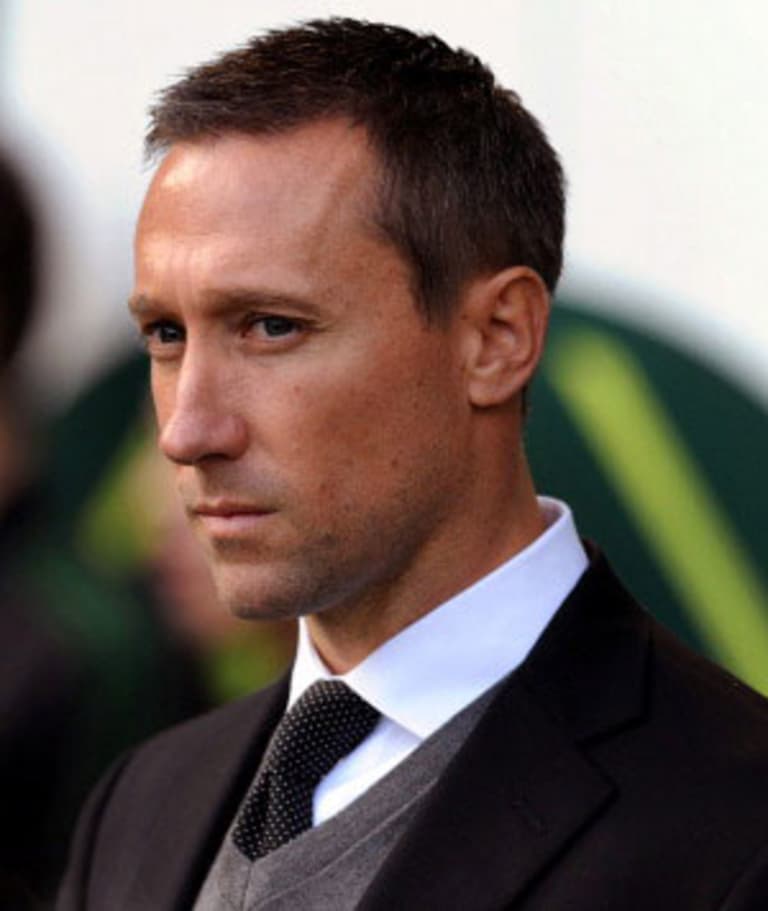
Porter joined the Timbers after a stellar seven-year run as the head coach at Akron University. He walked away from a deal that would have kept him at the school through 2020.
- Getty Images
“We’ve moved too many players, and [Paulson and Wilkinson] know that. It’s a reflection of mistakes,” Porter said. “In a way, I’m coming in at a good time, because I avoided that learning curve with Merritt and Gavin. They’ve had a couple of years to figure some things out. All I have to do is figure out the soccer side.”
He hasn’t quite figured it out yet. Through their first four games, the Timbers are still winless this season, while all three other first-year MLS coaches have already posted a win. Two of those coaches – Montreal’s Marco Schällibaum and Chivas USA’s José Luis "El Chelís" Sánchez Solá – have their teams at or near the top of their respective conferences.
WATCH THE TIMBERS FOR FREE THIS SATURDAY NIGHT
But Porter knows the drill. During his conversations with Paulson there’s talk about patience and club philosophy. They discuss the team’s identity, and the culture in Portland. Porter, Wilkinson and Paulson have weekly off-site meetings to reflect on the most recent game or what the latest scouting reports tell them. They discuss what went right, and what went wrong. There are no secrets.
But will patience and philosophy keep the team’s critics at bay? Doubtful. Paulson’s learned enough lessons about his fan base to know they’ll get restless again this summer if Porter can’t deliver.
“You never know in sports, but I think Caleb is a great hire,” Paulson said. “But this is a deep dive. And this was a process I was a lot more involved in. If we get this wrong, this one is entirely on us.”
---
It’s getting late on a Saturday night in February at JELD-WEN Field, and Paulson is nearly done for the day. The Timbers have just tied the final game of their annual preseason tournament, a sleepy 1-1 draw that Paulson hopes isn’t a harbinger of things to come in Year 3.
The good: More than 14,000 fans showed up for two of the team’s three games in the tournament, which would be solid attendance numbers for some MLS teams’ regular-season games, let alone an effectively meaningless set of games played in the rain weeks before the season starts.
The bad: The Timbers didn’t win a single game in the tournament. And that’s getting old. On this night Paulson will take Porter and Wilkinson out to dinner and they’ll talk about how to fix the problems, but every Timbers fan in the restaurant will know the clock is ticking on their team this year.
And it’s ticking inside Paulson’s head loudest of all.
“Here’s the deal,” says Portland Oregonian columnist John Canzano. “Last year he looked like he was twisted up in different points in the season. Of course the stadium’s full, and he’s going sell his tickets. But he wants to win.
“Now all of a sudden you’re getting people in the stadium saying: ‘Yeah this is a great atmosphere, it’s family friendly and it’s beautiful. But do I really want to keep coming here to watch this team get its teeth kicked in?’”
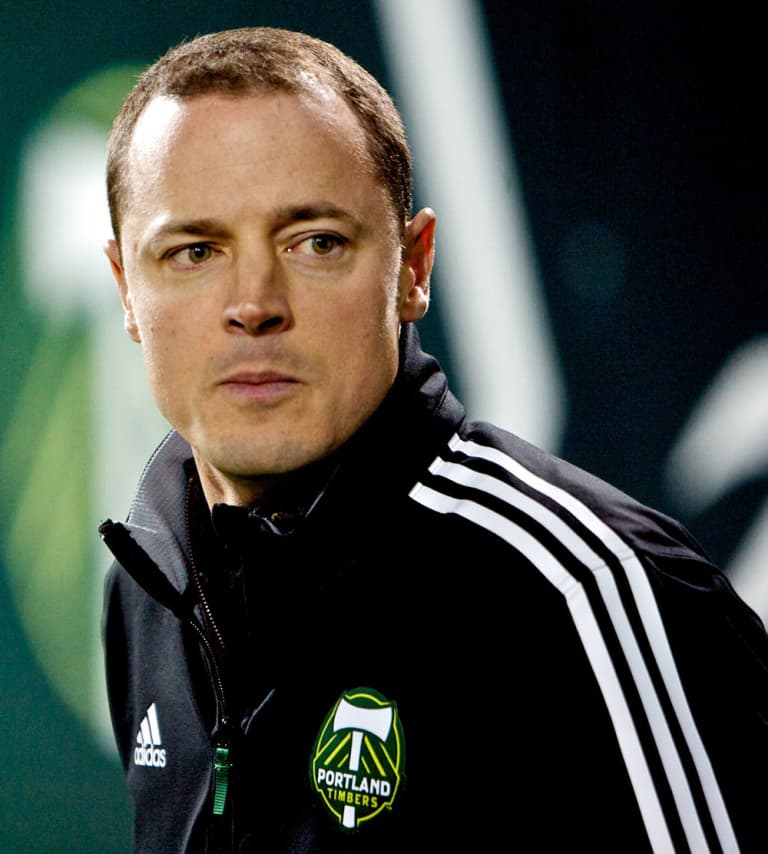
Paulson says he'll step back from the spotlight as the Timbers' owner this year, but insists: "I like being who I am, and I don’t try to be someone I’m not."
- Getty Images
Paulson’s business is sound. A number of prominent sponsorship deals are up after this season, including Widmer Brothers and Alaska Airlines, but he’s confident they’ll be renewed. The sponsors are happy, he insists. The TV people are, too, with the second-best local ratings in the league. Season-ticket prices are level.
But something is always stirring inside Paulson’s head. On this night he’s packing up his stuff and shutting down his computer, and he’s buzzing. The season is less than two weeks away and there’s still a whole new year ahead that can’t possibly be as bad as the last, but the expectations are starting to seep in.
Paulson’s torn on that topic, because it’s a double-edged sword. The franchise he’s tried to mold his after – Real Salt Lake – never endured this in their first few years on the map, because there were smaller, more reasonable expectations. They waited until Year 3 to find success. The fans afforded them that.
But not in Portland. Not where the team lives under the microscope, and, as Paulson says, time plays out like dog years. Not where more than 14,000 fans show up for a preseason game.
It’s a champagne problem to have, and Paulson knows that. He wouldn’t trade the Timbers Army or any of the other thousands of fans who flock downtown on summer nights to watch his team play. He wouldn’t give back the sponsors’ money or tear down the billboards. He would make the same deal with his father and the same investment to buy the team. He would battle for the stadium all over again if someone picked a fight.
“We overuse the word ‘authenticity,’ but especially here, I think the fans appreciate that,” he says. “I like being who I am, and I don’t try to be someone I’m not. So that’s me.”
Now the question becomes what kind of owner Paulson will be in Year 3. And if the first few months of the new year are any indication, then he has indeed stepped back from where he was in 2012. He’s vowed to stay out of online verbal spats with fans, and says he’s happy to let his coaches coach, hopefully finding success without leaving the owner’s fingerprints where they don’t belong.
When he stepped to the podium to open the team’s preseason luncheon during the week of the tournament, Paulson ceded the spotlight to Porter and his new team, painstakingly made over since the second-year debacle under Spencer, when ideologies clashed, egos buckled and soccer suffered.
For once, he kept his remarks brief.
“2013 is the dawn of the less-talk, more-action era of the Portland Timbers …” Paulson said. “I feel really good. I feel optimistic. And the team is going to speak for itself.”

